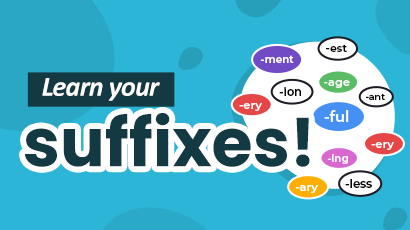Suffixes are powerful linguistic tools that can transform the meaning, function, and even the part of speech of a word. By understanding and incorporating suffixes into your language repertoire, you’ll be able to unlock a whole new world of words and express yourself with greater precision and nuance. Here are some examples of how suffixes can help you expand your vocabulary:

1.”-ful”
The versatile suffix “-ful”! This small but mighty suffix has the remarkable ability to completely transform the meaning of a word. When added to the end of a base word, “-ful” creates an adjective that conveys a sense of abundance, fullness, or possessing a particular quality to the highest degree.
Ex: Wonderful – full of wonder or causing wonder.
Playful – full of play or characterized by playfulness.
Beautiful – full of beauty or possessing beauty.
Grateful – full of gratitude or showing gratitude.
Cheerful – full of cheer or exhibiting a cheerful demeanor.
Successful – achieving success or having a successful outcome.
Joyful – full of joy or experiencing great happiness.
Colorful – full of color or vibrant in appearance.
Peaceful – full of peace or characterized by tranquility.
Resourceful – possessing the ability to find solutions or make the best use of resources.
2. “-ize”
The dynamic suffix “-ize”! This versatile suffix has the power to transform nouns and adjectives into verbs, giving them the meaning of “to make” or “to become.” By adding “-ize” to a base word, you can create new verbs that convey the action or process of the original word.
Ex: Organize – to arrange or put in order.
Prioritize – to give priority or importance to something.
Realize – to become aware or understand something.
Maximize – to make the best use of or optimize something.
Modernize – to update or bring up to date with modern standards.
Energize – to give energy or invigorate.
Specialize – to focus on or become an expert in a specific area.
Harmonize – to bring into harmony or agreement.
Symbolize – to represent or stand for something else.
3.”-able”
The versatile suffix “-able”! This suffix has the remarkable ability to transform verbs and some adjectives into adjectives, indicating the possibility or capability of the base word. When added to a word, “-able” creates an adjective that suggests that something can be done or achieved.
Ex: Achievable – capable of being achieved or accomplished.
Comfortable – providing physical or mental comfort.
Reliable – able to be trusted or depended on.
Adaptable – capable of adapting or adjusting to different circumstances.
Valuable – having great worth or importance.
Remarkable – worthy of attention or notice.
Responsible – able to be held accountable or trusted with tasks.
Manageable – capable of being managed or controlled.
Memorable – likely to be remembered or leaving a lasting impression.
Enjoyable – capable of being enjoyed or providing pleasure.
4. “-ment”
The versatile suffix “-ment”! This suffix is used to form nouns from verbs, indicating the action or result of the verb. When added to a base word, “-ment” creates a noun that represents the process, state, or result of the action described by the verb.
Ex: Development – the process of growing, progressing, or advancing.
Achievement – the act of accomplishing or reaching a goal.
Improvement – the act or process of making something better or enhancing it.
Treatment – the act or process of providing medical care or therapy.
Movement – the act or process of changing position or location.
Employment – the state or act of being employed or having a job.
Assessment – the process of evaluating or judging something.
Management – the act or process of controlling or overseeing something.
Measurement – the act or process of determining the size, quantity, or extent of something.
Announcement – the act of making something known or public.
5. “-ly”
The suffix “-ly” is one of the most common suffixes in English. When added to an adjective, it forms an adverb that describes how an action is performed or how something is done. Adverbs with the “-ly” suffix often answer questions like how, when, where, or to what extent.
Ex: Quickly – in a fast or rapid manner.
Carefully – in a cautious or attentive manner.
Happily – in a joyful or contented manner.
Quietly – in a silent or calm manner.
Clearly – in a way that is easy to understand or perceive.
Slowly – in a slow or leisurely manner.
Loudly – in a loud or boisterous manner.
Beautifully – in a beautiful or aesthetically pleasing manner.
Brightly – in a bright or vivid manner.
Gently – in a soft or delicate manner.
In conclusion, expanding your vocabulary by utilizing suffixes is an excellent way to enhance your language skills. By incorporating these suffixes into your vocabulary, you can express yourself with greater precision, convey nuanced ideas, and communicate more effectively. So, let’s dive into the world of suffixes and unlock the power of language to expand our horizons!
